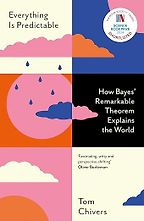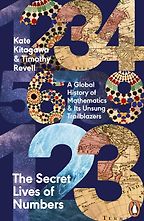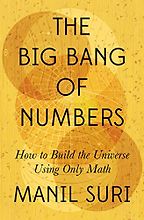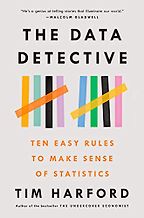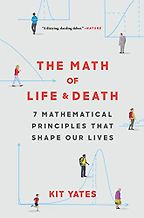New Mathematics Books
Last updated: October 11, 2024
It's a golden age for popular math books and as new books are published, we'll list the ones written by Five Books interviewees and frequently recommended authors, here. Please email us ([email protected]) with any books that should appear on this list.
“I wish I’d read this book years ago. Bayesian statistics is all over my area of research—and, as the book argues, it’s all over everywhere, and it has long been so. But the general public is not aware of this, and even many scientists, I think, are not aware of Bayes’ theorem. In a way, the book is pretty simple. It’s about one equation, which calculates the probability of something, given a piece of evidence and your confidence in that evidence. There’s a way you go through, calculating the probability of some event, adjusting your calculations as new evidence comes in—and that’s it, really. But the author does a great way of explaining how this is counter-intuitive to a lot of people.” Read more...
“Reading the book was the first time I understood properly what calculus was about, by reading how it was developed, step by step. What they have managed to do is to give mathematics a narrative history that can be understood by non-mathematicians, and this requires a lot of skill. There’s a wonderful phrase they use at some point in the book: ‘Mathematics is a relay’. They bring out very fluently the ways in which the baton is passed on.” Read more...
The 2024 British Academy Book Prize for Global Cultural Understanding
Charles Tripp, Political Scientist
“You don’t actually do any math in the book, he talks about what, chronologically, was next discovered, and the next step that makes sense. It took hundreds of years to make each discovery, but each step is logical. He’s basically explaining the mathematical ideas you use every day. It’s elegant, it’s beautiful, and the level is quite reasonable.” Read more...
The Best Literary Science Writing: The 2023 PEN/E.O. Wilson Book Award
David Hu, Scientist
I Can't Do Maths: Why Children Say It and How to Make A Difference
by Alf Coles & Nathalie Sinclair
In I Can't Do Maths two professors of maths education, Alf Coles and Nathalie Sinclair, look at why it is that some kids are put off learning maths and whether there's a way around this. In particular, they analyze five 'dogmas' that they challenge, including 'Maths is always right or wrong' and 'Maths is for some people not others.'
The Data Detective: Ten Easy Rules to Make Sense of Statistics
by Tim Harford
***One of the best books on critical thinking, recommended by Nigel Warburton***
"There are three kinds of lies: lies, damned lies and statistics," said Benjamin Disraeli (according to Mark Twain, anyway), in what has become one of the most well-known quotations in the English language, and certainly the only one most of us know about statistics. And yet...in practice many of us continue to be misled by them on a daily basis. In The Data Detective (called How to Make the World Add Up in the UK), British economist Tim Harford tries to equip us with tools to take on the latest misinformation.
We've also interviewed Tim, a Financial Times columnist and BBC Radio and TV presenter, about books on two topics: Unexpected Economics (including a comic book) and the best Introductions to Economics.
The Wonder Book of Geometry: A Mathematical Story
by David Acheson
From Thales's theorem to the Banach-Tarski paradox, Oxford mathematician David Acheson's book, The Wonder Book of Geometry, is a lively attempt to bring to life geometry—literally, 'earth measurement'—and make it accessible to the general public. It has a lot of illustrations, not just of triangles, but portraits of mathematicians (like Euclid of Alexandria), maps, early editions of books, news clippings, a Ming dynasty copy of an ancient Chinese text, even postage stamps. According to Acheson, he wrote the book “because I believe that geometry can offer the quickest route to the whole nature and spirit of mathematics at its best, at almost any age, provided the subject is presented with sufficient imagination.”
The Math of Life and Death
by Kit Yates
The Math of Life and Death, by Kit Yates, a senior lecturer in mathematical biology at the University of Bath, is an excellent popular math book, demonstrating the many times math plays a critical role in our daily lives—often without us even knowing it.
Kit Yates chose the Best Math Books of 2019 for us. Is math really a matter of life or death? He spoke to us about his book in a Q&A.
